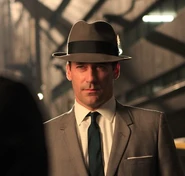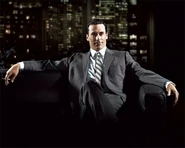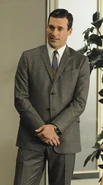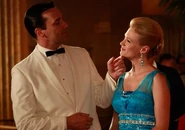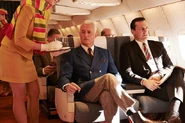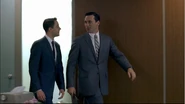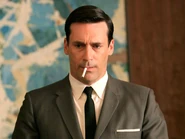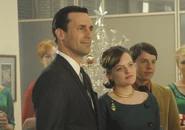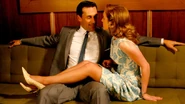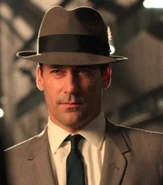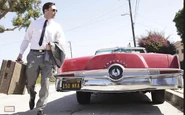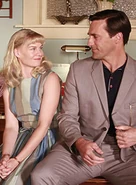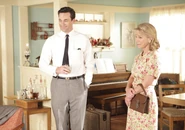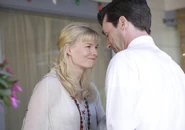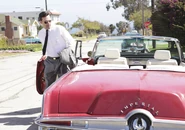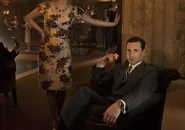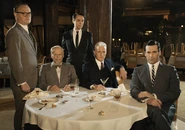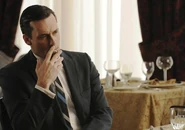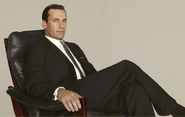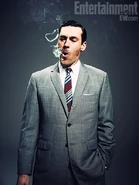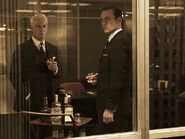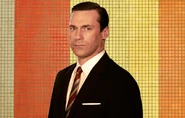No edit summary |
|||
| Line 88: | Line 88: | ||
'''Don:''' ''"Teddy told me that in Greek nostalgia literally means, the pain from an old wound. Its a twinge, in your heart. Far more powerful then memory alone. This device isn't a spaceship, its a time machine. It goes backwards, forwards. It takes us to a place, where we ache to go again. It's not called 'The Wheel.' Its called 'The Carousel.' It lets us travel in a way a child travels. Round and round, and then back home again. To a place where we know we are loved."''<br />'''- Don pitching 'The Wheel' to Kodak, in [[The Wheel]].''' |
'''Don:''' ''"Teddy told me that in Greek nostalgia literally means, the pain from an old wound. Its a twinge, in your heart. Far more powerful then memory alone. This device isn't a spaceship, its a time machine. It goes backwards, forwards. It takes us to a place, where we ache to go again. It's not called 'The Wheel.' Its called 'The Carousel.' It lets us travel in a way a child travels. Round and round, and then back home again. To a place where we know we are loved."''<br />'''- Don pitching 'The Wheel' to Kodak, in [[The Wheel]].''' |
||
| + | |||
| + | ==Clothing/Fashion Style== |
||
| + | Don Draper's style is sharp, suave, and subtly powerful. The collar of his crisp white dress shirt stands at attention, his suit is slim cut, his tie saber-straight. Don generally sticks to a monochromatic color-scheme--he doesn't need color to make a splash. Don is suffering some personal turmoil this season, and his slightly rumpled wardrobe reflects his inner chaos and new bachelor lifestyle. We hate to say it, but Betty was Don's most stylish accessory; without her he's a bit lackluster. Of all the characters, Don is the least to change throughout the decade of the 1960's. His basic grey or blue suit, white shirt, dark tie and hat remain even toward the end of the decade when such a look was in decline. Don transcends fashion; he has the eternal iconic appearance as the man in the gray/grey suit. |
||
==Gallery== |
==Gallery== |
||
<gallery> |
<gallery> |
||
| + | Donhat.jpg |
||
| + | Bestsuit.jpg |
||
| + | draperstylenewsuit.jpg |
||
| + | DrapersTOURQmadmenstyle.jpg |
||
| + | Roger don twa.jpg |
||
| + | Mad Men S7 Don off plane.jpg |
||
| + | Smoke gets in your eyes pete don.jpg |
||
| + | Don new amsterdam.jpg |
||
dondraper.jpg |
dondraper.jpg |
||
Ep1jantzen.jpg |
Ep1jantzen.jpg |
||
Revision as of 01:19, 22 October 2014
| Don Draper | |
|---|---|
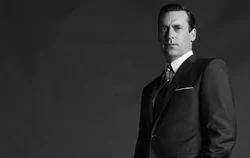
| |
| Portrayed by | Jon Hamm |
| First appearance | Smoke Gets In Your Eyes |
| Final appearance | Recurring |
| Details | |
| Gender | Male |
| Employer | Sterling Cooper & Partners (current) Sterling Cooper Draper Pryce (former) Sterling Cooper Advertising Agency (former) United States Army (former) |
| Occupation | Founding and Senior Partner and Head of Creative at Sterling Cooper & Partners (Current) Founding and Senior Partner and Creative Director at Sterling Cooper Draper Pryce (former) Junior Partner and Creative Director at Sterling Cooper Advertising Agency (former) Creative Director at Sterling Cooper Advertising Agency (former) Fur Salesman and Copywriter (former) Car Salesman (former) United States Army Private (former) |
| Residence | Manhattan, NYC (currently) Ossining, NY (formerly) |
| Relations | |
| Wife | Megan Draper (third wife) |
| Ex-Wife | Anna Draper (first wife, annuled) Betty Francis (second wife, divorced) |
| Romantic Partners | Rachel Menken Midge Daniels Bobbie Barrett Faye Miller Sylvia Rosen |
| Parent(s) | Unnamed prostitute (true mother) Abigail Whitman (step-mother, deceased) Archie Whitman (true father, deceased) Mack Johnson (common law step-father, deceased) |
| Child(ren) | Sally Draper Bobby Draper Eugene Scott Draper |
| Sibling(s) | Adam Whitman (paternal half-brother, deceased) |
- "You're born alone and you die alone and this world just drops a bunch of rules on top of you to make you forget those facts. But I never forget. I'm living like there's no tomorrow, because there isn't one."
- -Don Draper, Smoke Gets In Your Eyes
Donald Francis "Don" Draper is a founding partner and the Creative Director at Sterling Cooper Draper Pryce Advertising Agency in Manhattan, NY.[1] Prior to that position, he was the Director of the Creative Department at the Sterling Cooper Advertising Agency.[2]. He is regarded among his colleagues as the best to ever pitch copy. His true name is Richard "Dick" Whitman. He stole the identity of a dead officer during the Korean War.
Childhood
Born in 1926[3], Richard "Dick" Whitman was the illegitimate child of a prostitute who died during childbirth. Dick lived with his father, Archie Whitman, and his father's wife, Abigail Whitman, until he was 10, at which time his father, a drunk, was kicked in the face by a horse and died. His stepmother then "took up" with a new man, "Uncle Mack," and had another son named Adam. His childhood was unhappy, and his stepmother never allowed him to forget that he was a "whore's child." [4]
Life in the Brothel
After moving into Uncle Mack's brothel, Dick spent his adolescence pick-pocketing the clients of the establishment. His motivation for stealing was money to buy Hershey's Chocolate bars. During this time, Dick Whitman heard about Milton S. Hershey and his school for orphans and imagined what it would be like to grow up in a happy place such as that.
Military Service
During military service in the Korean War he assumed the identity of Lieutenant Don Draper after he was killed while the two were posted alone at an isolated base. Dick then switched identification tags with Lt. Draper and assumed his name, cutting off contact with his family and creating a new life for himself.[5]
A New Life
Dick returns to the states as Don Draper. He takes up a job at a car dealership, where Anna M. Draper, the real Don Draper's wife, confronts him, telling Don that she knows he isn't who he claims he is.[6] Don comes clean with Anna, and promises to help take care of her, and they end up becoming close friends.[7] Don eventually meets a young model named Betty Hofstadt. He excitedly tells Anna about her on their next Christmas together. Since Don Draper is still technically married to Anna, he tells her they will have to divorce so he can marry Betty, a request to which Anna cheerfully consents.[8]
Don later works in New York city at Heller's, a specialty shop dealing in fur coats. Roger Sterling walks into the store, asking about a mink coat for a special lady he has just started seeing. Roger comments on an advertisement and Don notes that it is one of his own. Roger hands Don a card, indicating that Roger works for an advertising firm.
When Roger opens the box up for Joan in a hotel room, he notices that Don has included a portfolio; he considers Don to be "out of line" for including it. A few days later, Don runs into Roger in the lobby of Sterling Cooper, and tries to explain it away as coincidence. He asks Roger if he saw his work; Roger tells him that it was thrown away with the box. Don offers Roger a drink, and though it is 10am, Roger accepts. Over drinks, Don tries to sell Roger on the idea of hiring him.
A few days later, Roger sees Don in the lobby again, waiting for the elevator. Roger is beside himself, angry that Don could not take a hint that he was not interested. Don stops Roger; while they board the elevator, he reminds Roger that he had offered Don a job the day before. Don smiles as Roger appears confused about his lapse in memory.[9]
Ad Man



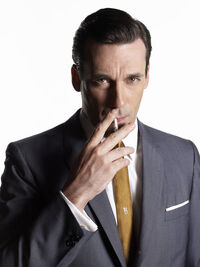
Don Draper has an intuitive understanding of the consumer's mind, making him a brilliant ad man and the award-winning star of Sterling Cooper — attracting and retaining major clients, commanding respect from those above and below him, being courted by rival firms, and generally living the picture-perfect life of a successful businessman in the early 1960s. However, Don rarely seems happy with his "perfect" life: he is often stressed, drinks and smokes constantly, and is prone to spells of moodiness.
Draper's tenuous and complex feelings toward his children are revealed when Pete Campbell threatens to expose his past—Don, at least momentarily, considered fleeing to Los Angeles and abandoning his wife and children. Bert Cooper makes him a partner after Roger Sterling's most recent heart attack.
While he appears to love his wife, Betty, he is constantly sleeping with other women. He had a brief affair with client Rachel Menken and was previously involved with beatnik Midge Daniels. He has left work in the middle of the day to see French New Wave films, and reads poetry by the likes of Frank O'Hara. Don has an affair with Bobbie Barrett, the wife of actor/comedian Jimmy Barrett. Betty, Don's wife, kicks him out of their house because of his refusal to admit to his affairs.
After Betty kicks him out, he stays in a hotel and then visits Los Angeles for three weeks. He returns home at Betty's behest during the Cuban Missile Crisis. In 1963, Betty gives birth to their third child; she names him after her father, Eugene Hofstadt, who passed away during her pregnancy. Betty has an unconsummated affair with Henry Francis. Later, Betty discovers Don's true identity and confronts him; Don breaks down and reveals his past. Several weeks later, this discovery of Don's identity becomes a contributing factor in Betty requesting a divorce; other factors include Henry Francis' proclamation of love and the assassinations of John Kennedy and Lee Harvey Oswald.
A New Company

When rumors of the purchase of parent company of Sterling Cooper reach Don Draper, he pushes the senior partners to attempt a purchase of the company. Because he was forced to sign a contract to gain the business of Conrad Hilton, he is an employee of the company regardless of who owns it. After presenting an offer, they realize it's a lost cause, until they hit upon an idea. Pryce, the representative from PPL with authority over everyone at Sterling Cooper, agrees to fire the senior partners, thereby severing their contracts (including the no-compete clauses in their contracts.)
They secretly round up a list of clients loyal to them and steal important documentation that will smooth the transition. And they quietly select the first employees: Pete Campbell, Peggy Olson, Joan Harris, and Harry Crane.[10]
After the new company is formed, an interview with Don by a reporter from Advertising Age leads to bad publicity for the agency, which leads to a narrow client base and the Jai Alai account to be lost due to the fact that Don did not mention the client in the interview. The loss affects the agency financially as a result of the few clients it has. Peggy hires two actresses to keep an account at the agency as part of a publicity stunt, however it backfires after one of the actresses sues the other one for assault. Don gives Peggy bail and hush money, expressing disparagement of the idea, although Peggy informs him that it worked to the effect that the account has stayed with the agency.
Relationships
Throughout the entire run of the series, Don Draper has been portrayed as a serial womanizer. Here is a list of all the women he has been involved with throughout Season's 1 - 6.
- Betty Francis[11]
- Midge Daniels[12]
- Rachel Menken[13]
- Bobbie Barrett[14]
- Joy[15]
- Shelly (Overly flirtatious air-stewardess)[16]
- Suzanne Farrell[17]
- Candace[18]
- Bethany Van Nuys[19]
- Allison[20]
- Unnamed woman at the Clio's[21]
- Doris[22]
- Faye Miller[23]
- Megan Draper[24]
- Sylvia Rosen
Quotes
Don: "She won't get married, because she's never been in love. I think I used that to sell nylons."
Rachel: "For a lot of people, love isn't just a slogan."
Don: "You mean love, you mean the big lightening bolt to the heart, where you can't eat, you can't work - you just run off and get married and make babies. The reason you haven't felt it is because it doesn't exist. What you call love was invented by guys like me, to sell nylons."
Rachel: "Is that right?"
Don: "Im sure about it. You're born alone and you die alone, and this world just drops a bunch of rules on top of you, to make you forget those facts - but I never forget. I'm living like there's no tomorrow; because there isn't one."
Rachel: "I don't think I realized until this moment that it must be hard, being a man too."
- Don Draper on the subject of love in Smoke Gets in Your Eyes.
Don: "Utopia."
Rachel: "Maybe. They taught us at Barnard about that word. Utopia. The greeks had two meanings for it: 'eu-topos,' meaning 'the good place' and 'ou-topos,' meaning 'the place that cannot be.'"
- A discussion between Don and Rachel, in Babylon.
Don: "Teddy told me that in Greek nostalgia literally means, the pain from an old wound. Its a twinge, in your heart. Far more powerful then memory alone. This device isn't a spaceship, its a time machine. It goes backwards, forwards. It takes us to a place, where we ache to go again. It's not called 'The Wheel.' Its called 'The Carousel.' It lets us travel in a way a child travels. Round and round, and then back home again. To a place where we know we are loved."
- Don pitching 'The Wheel' to Kodak, in The Wheel.
Clothing/Fashion Style
Don Draper's style is sharp, suave, and subtly powerful. The collar of his crisp white dress shirt stands at attention, his suit is slim cut, his tie saber-straight. Don generally sticks to a monochromatic color-scheme--he doesn't need color to make a splash. Don is suffering some personal turmoil this season, and his slightly rumpled wardrobe reflects his inner chaos and new bachelor lifestyle. We hate to say it, but Betty was Don's most stylish accessory; without her he's a bit lackluster. Of all the characters, Don is the least to change throughout the decade of the 1960's. His basic grey or blue suit, white shirt, dark tie and hat remain even toward the end of the decade when such a look was in decline. Don transcends fashion; he has the eternal iconic appearance as the man in the gray/grey suit.
Gallery
References
- ↑ Shut the Door. Have a Seat
- ↑ Smoke Gets In Your Eyes
- ↑ http://www.amctv.com/originals/madmen/episode310
- ↑ The Hobo Code
- ↑ Nixon vs. Kennedy
- ↑ The Mountain King
- ↑ The Gold Violin
- ↑ The Mountain King
- ↑ Waldorf Stories
- ↑ Shut the Door. Have a Seat
- ↑ Smoke Gets in Your Eyes
- ↑ Smoke Gets in Your Eyes
- ↑ Marriage of Figaro
- ↑ The Benefactor
- ↑ The Jet Set
- ↑ Out of Town
- ↑ Wee Small Hours
- ↑ Public Relations
- ↑ Public Relations
- ↑ Christmas Comes But Once a Year
- ↑ Waldorf Stories
- ↑ Waldorf Stories
- ↑ The Summer Man
- ↑ Chinese Wall
